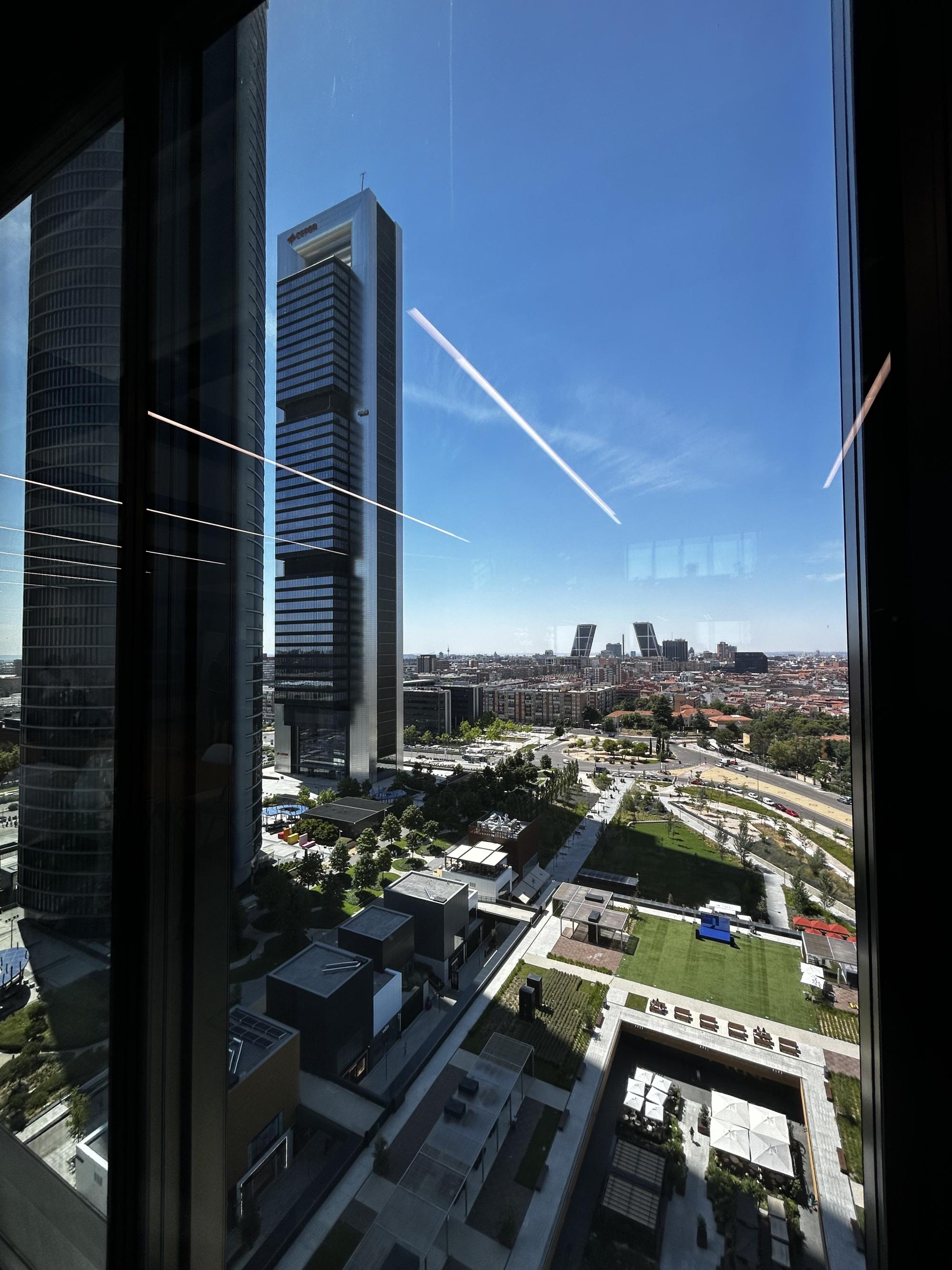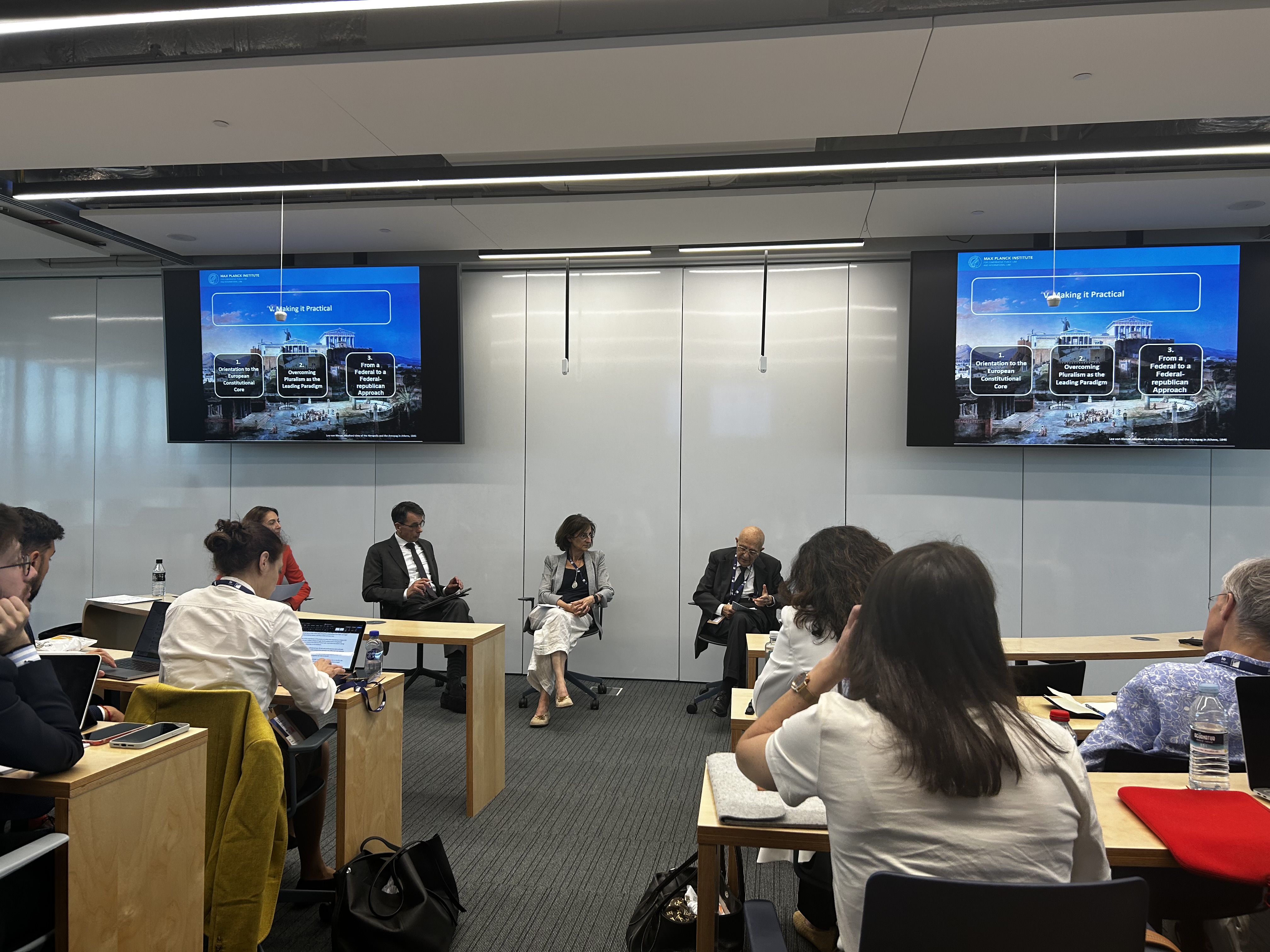Revisiting Madrid: Personal Reflections and Academic Debates at the ICON·S 2024 Annual Conference
A GEM-DIAMONd fellows impressions from the 10th Annual Conference of the International Society of Public Law (ICON·S)

Revisiting Madrid: Personal Reflections and Academic Debates at the ICON·S 2024 Annual Conference
Returning to Madrid in early July was a blend of nostalgia and new discoveries. Having lived here for four years, I was eager to dive back into the city's vibrant lifestyle and culinary scene. The food, as always, did not disappoint. The city's unique blend of old-world charm and modern vibrancy enhanced the academic experience, making my return even more special.
My visit coincided with the 10th Annual Conference of the International Society of Public Law (ICON·S) at IE University from July 8th to 10th, 2024. This significant event brought together around two thousand scholars from various research areas related to public law. The conference featured dozens of panels held in parallel sessions, sparking vibrant debates and discussions among attendees. The installations and spectacular views from the IE Tower, part of the Caleido complex, contributed to a positive atmosphere, making the conference both intellectually stimulating and aesthetically pleasing.
The conference's success was evident from the warm reception attendees received. Scholars had ample opportunities to meet peers, share ideas, and foster collaborations. The venue's state-of-the-art facilities provided an inspiring backdrop for the exchange of knowledge and ideas. The range of topics discussed reflected the current state of the field, highlighting how public law is increasingly global and multidisciplinary, transcending legal cultures, jurisdictions, and traditions. This gathering underscored the mission to foster positive change through comprehensive research and innovative teaching methodologies, educating internationally-minded professionals in the practice of law.
What made this trip truly memorable was the company. Reconnecting with friends and meeting new ones brought an added layer of joy to my trip. One evening, we found ourselves in a cozy bar, sharing plates while discussing our PhD journeys and how our academic roles impact our lives and views. This camaraderie extended into the conference as well, where scholars had ample opportunities to meet peers, share ideas, and foster collaborations, creating a sense of community within the academic setting.
The 2024 Annual Conference, themed “The Future of Public Law: Resilience, Sustainability, and Artificial Intelligence,” addressed critical issues at the intersection of public law and emerging global challenges. The focus on resilience, sustainability, and AI brought critical discussions to the forefront. The variety of topics covered showcased the field's evolution, with legal academics and professionals playing a crucial role in addressing global issues such as the protection of the rule of law, sustainability, and the regulation of artificial intelligence. The conference strengthened the links within a global community of academics and jurists across all areas of public law, including international law, constitutional law, and administrative law.
The weather, true to Madrid's summer, was warm and sunny, sometimes bordering on hot. Despite the heat, the clear skies and bright days made the city come alive. Walking through Madrid's historic streets, I found myself rediscovering its charm. The shade of grand buildings and the cool respite of parks provided a pleasant balance to the summer warmth, making each walk through the city an enjoyable opportunity to clear one’s mind. The ICON·S conference provided a perfect mix of rigorous academic discourse and a vibrant, welcoming atmosphere.
This year marks the tenth anniversary of ICON·S, celebrated with its largest-ever conference. As the Society looks forward, the incoming co-presidents for 2024-2027, Sergio Verdugo and Michaela Hailbronner, acknowledged the significant legacy they inherit. Since the Society's founding by Joseph Weiler and Sabino Cassese in 2014 in Florence, the world has undergone substantial changes, including a global pandemic, the rise of authoritarian regimes, and increasing awareness of climate change. The emergence of artificial intelligence and other technologies has also introduced new ethical and legal challenges.
 For me, one of the standout moments of the conference was my presentation on “The (Un)Democratic Nature of the Constitutional Politics of the EU.” I explored various ideas I work with in my PhD dissertation. My objective was to test these ideas and contribute to the ongoing debate. I introduced the core critique: the potentially undemocratic nature of the constitutional politics of the EU. The main issue I highlighted was the absolute primacy of EU law, which can displace national constitutional law in case of conflict. I argued that this situation undermines democratic legitimacy because national constitutions, following the theory of constituent power, result from the direct will of the people. I provided a hypothetical scenario, based on a real case, to illustrate how national executives might de facto amend national constitutions via EU law. This bypassing of national amendment procedures leads to democratic deficiencies. I concluded by suggesting that the ideal solution might lie in drafting a formal European Constitution with direct citizen involvement, transforming the EU into a federal state or a federation with a constitution hierarchically superior to national constitutions.
For me, one of the standout moments of the conference was my presentation on “The (Un)Democratic Nature of the Constitutional Politics of the EU.” I explored various ideas I work with in my PhD dissertation. My objective was to test these ideas and contribute to the ongoing debate. I introduced the core critique: the potentially undemocratic nature of the constitutional politics of the EU. The main issue I highlighted was the absolute primacy of EU law, which can displace national constitutional law in case of conflict. I argued that this situation undermines democratic legitimacy because national constitutions, following the theory of constituent power, result from the direct will of the people. I provided a hypothetical scenario, based on a real case, to illustrate how national executives might de facto amend national constitutions via EU law. This bypassing of national amendment procedures leads to democratic deficiencies. I concluded by suggesting that the ideal solution might lie in drafting a formal European Constitution with direct citizen involvement, transforming the EU into a federal state or a federation with a constitution hierarchically superior to national constitutions.
The ongoing evolution of comparative public law as a discipline was a prominent theme throughout the conference. Scholars are striving to understand how public law shapes the present and can contribute to a better future. However, with the growth of the field and the Society, new challenges have emerged. Networks play a crucial role, and the Society itself functions as a network. Questions arise about how inclusive the Society is to those outside certain "in-groups" or to scholars who prefer not to brand themselves. Additionally, as we face the need to reduce air travel, enabling global conversations and research cooperation becomes more complex. Although legal comparison in public law is more prevalent today than it was twenty years ago, conducting comparative work well remains a challenge.
While ICON·S cannot solve all these problems, the Society hopes to take meaningful steps in the right direction over the coming years. The new leadership invites all members to share ideas, criticisms, and suggestions, fostering a collaborative effort to address these issues. The 10th Annual ICON·S Conference in Madrid was a resounding success, highlighting the vibrant and dynamic nature of public law scholarship. Celebrating a decade of ICON·S, the Society continues to evolve, addressing new challenges and embracing opportunities to advance public law scholarship globally.
The faculty, students, and staff of IE Law School worked diligently to ensure that the ICON·S 2024 Annual Conference would be a memorable and impactful event. This conference stands as a landmark in the field of public law, reflecting the ongoing commitment to fostering global dialogue and collaboration. As I walked through the familiar streets of Madrid, blending my personal journey with the academic rigor of the conference, I was reminded of why feel to connected to this city. As I reflect on my time in Madrid, blending personal connections with academic rigor, I appreciate the lasting impact of this experience on my professional journey.
